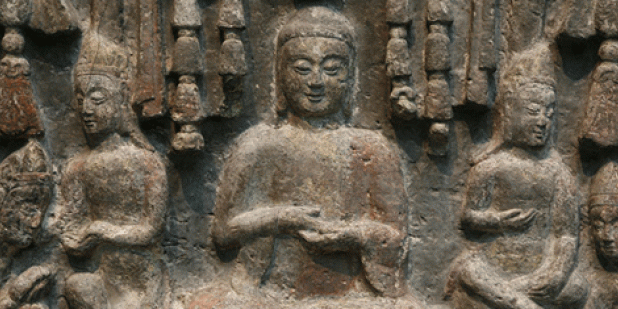Join us for a free one-day workshop for educators at the Japanese American National Museum, hosted by the USC U.S.-China Institute and the National Consortium for Teaching about Asia. This workshop will include a guided tour of the beloved exhibition Common Ground: The Heart of Community, slated to close permanently in January 2025. Following the tour, learn strategies for engaging students in the primary source artifacts, images, and documents found in JANM’s vast collection and discover classroom-ready resources to support teaching and learning about the Japanese American experience.
Promise of Paradise: Early Chinese Buddhist Sculpture
The Freer Gallery of Art features an exhibition of Buddhist Sculpture, ranging from gilt bronze images to stone figures in cave temples.
Where

Buddhism is founded on the religious principles and practices expounded by Siddhartha Gautama (circa 563–483 BCE), a spiritual teacher from the Indian subcontinent. Through a long period of meditation he cultivated a mind free of ignorance, greed, and hatred. Thus enlightened and freed from the cycle of rebirth, he became known as the Buddha, the "awakened one" in Sanskrit, and Shakyamuni, literally Sage of the Shakyas, after his clan group. Missionaries conveyed his teachings from India across Central Asia to northwest China by 100 CE, where the faith ultimately prospered.
As Buddhism developed, paths to spiritual understanding multiplied; additional deities and disciplines were identified to offer different kinds of guidance to enlightenment. Representations of four different Buddhas—Shakyamuni (the Historical Buddha), Prabutaratna (Buddha of the Remote Past), Amitabha (Buddha of the Western Paradise), and Vairochana (the Cosmic Buddha)—along with divinities such as Avalokiteshvara, the Bodhisattva of Compassion, and Maitreya, the Buddha of the Future are featured. In keeping with their Indian origins, they are frequently referred to by their Sanskrit names and the names they were given in Chinese.
Most of these images were created from the sixth to the eighth century, when Buddhism was widely followed in China and styles of religious sculptures rapidly evolved. During this period, gilt bronze images were made for domestic altars while more monumental stone figures were created for large freestanding temple buildings and man-made cave chapels. Although they are now removed from their original context, these icons still represent specific Buddhist teachings. Commissioned by emperors and commoners, they all convey the enduring appeal of the promise of paradise.
This exhibition is made possible through the generous support of the Thaw Charitable Trust.
Featured Articles
Please join us for the Grad Mixer! Hosted by USC Annenberg Office of International Affairs, Enjoy food, drink and conversation with fellow students across USC Annenberg. Graduate students from any field are welcome to join, so it is a great opportunity to meet fellow students with IR/foreign policy-related research topics and interests.
RSVP link: https://forms.gle/1zer188RE9dCS6Ho6
Events
Hosted by USC Annenberg Office of International Affairs, enjoy food, drink and conversation with fellow international students.
Join us for an in-person conversation on Thursday, November 7th at 4pm with author David M. Lampton as he discusses his new book, Living U.S.-China Relations: From Cold War to Cold War. The book examines the history of U.S.-China relations across eight U.S. presidential administrations.




